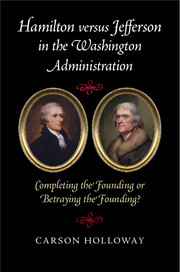 Hamilton versus Jefferson in the Washington Administration
Hamilton versus Jefferson in the Washington Administration Book contents
- Frontmatter
- Dedication
- Contents
- Acknowledgments
- 1 Introduction
- PART I A DEBATE BETWEEN CABINET COLLEAGUES
- PART II A CLASH OF RIVAL PARTY LEADERS
- PART III Founding Foreign Policy
- 11 Two Views of the French Revolution
- 12 Faith among Nations I: Jefferson's Opinion on the French Treaties
- 13 Faith among Nations II: Hamilton's Opinion on the French Treaties
- 14 The Constitutional and Political Theory of Hamilton's Pacificus Papers
- 15 Jefferson, Madison, and Helvidius' Critique of Pacificus
- 16 Conclusion
- Index
11 - Two Views of the French Revolution
from PART III - Founding Foreign Policy
Published online by Cambridge University Press: 05 November 2015
- Frontmatter
- Dedication
- Contents
- Acknowledgments
- 1 Introduction
- PART I A DEBATE BETWEEN CABINET COLLEAGUES
- PART II A CLASH OF RIVAL PARTY LEADERS
- PART III Founding Foreign Policy
- 11 Two Views of the French Revolution
- 12 Faith among Nations I: Jefferson's Opinion on the French Treaties
- 13 Faith among Nations II: Hamilton's Opinion on the French Treaties
- 14 The Constitutional and Political Theory of Hamilton's Pacificus Papers
- 15 Jefferson, Madison, and Helvidius' Critique of Pacificus
- 16 Conclusion
- Index
Summary
The momentous events of 1793 precipitated the last great debate between Hamilton and Jefferson as members of Washington's cabinet. Jefferson resigned as secretary of state by the end of the year, and Hamilton followed him into retirement a little over a year later. While these formidable antagonists continued to represent opposed approaches to the questions that dominated American politics for the rest of that decade, and indeed became the de facto heads of the political parties that had formed around those questions, their departure from the administration prevented their engaging so directly and with such clarity as they had done while they both served the same president.
The events of 1793 also shifted the field of their intellectual combat from domestic to foreign policy. In February, revolutionary France declared war on Great Britain and ended up at war with most of the monarchical nations of Europe. These developments placed America in a difficult position, insofar as it had ties to both of the leading belligerents. Great Britain was America's antagonist in the recent struggle for independence but was still the mother country, related to its former colonies by ties of history, ethnicity, and language. France had helped America against Britain, was united to America by a treaty of alliance, and, having thrown off monarchy and adopted republicanism, apparently shared America's deepest political principles. That America was a young and weak nation, with little to gain and much to lose from becoming involved in a war between such great powers, added to the perplexity and danger.
The debates of 1793 were also somewhat different in their scope. The earlier disputes had been about both policy and principle. On the international questions of 1793, however, Hamilton and Jefferson did not oppose each other on the basic question of policy. Although they engaged in considerable wrangling over details of implementation, both agreed that America should not involve itself in the war between France and Great Britain. They nevertheless found matter about which to disagree, and they argued their positions with no less vehemence than that with which they had contested the earlier issues of domestic governance.
- Type
- Chapter
- Information
- Hamilton versus Jefferson in the Washington AdministrationCompleting the Founding or Betraying the Founding?, pp. 207 - 221Publisher: Cambridge University PressPrint publication year: 2015


